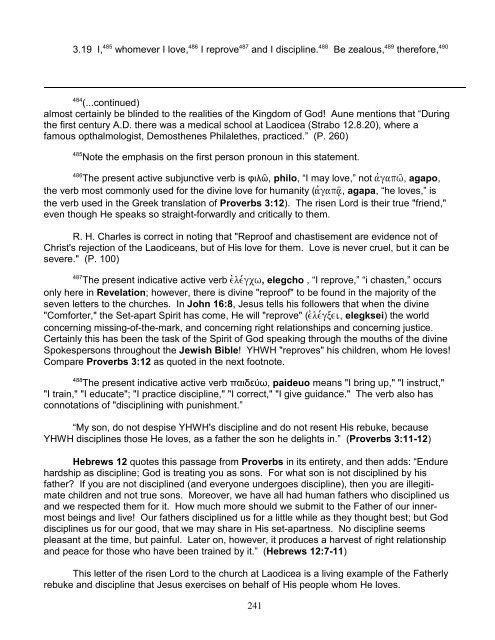Revelation 3:14-22 - Indepthbible.org
Revelation 3:14-22 - Indepthbible.org
Revelation 3:14-22 - Indepthbible.org
You also want an ePaper? Increase the reach of your titles
YUMPU automatically turns print PDFs into web optimized ePapers that Google loves.
485 486 487 488 489 490<br />
3.19 I, whomever I love, I reprove and I discipline. Be zealous, therefore,<br />
484<br />
(...continued)<br />
almost certainly be blinded to the realities of the Kingdom of God! Aune mentions that “During<br />
the first century A.D. there was a medical school at Laodicea (Strabo 12.8.20), where a<br />
famous opthalmologist, Demosthenes Philalethes, practiced.” (P. 260)<br />
485<br />
Note the emphasis on the first person pronoun in this statement.<br />
486<br />
The present active subjunctive verb is öéë, philo, “I may love,” not avgapw/, agapo,<br />
the verb most commonly used for the divine love for humanity (avgapa/|, agapa, “he loves,” is<br />
the verb used in the Greek translation of Proverbs 3:12). The risen Lord is their true "friend,"<br />
even though He speaks so straight-forwardly and critically to them.<br />
R. H. Charles is correct in noting that "Reproof and chastisement are evidence not of<br />
Christ's rejection of the Laodiceans, but of His love for them. Love is never cruel, but it can be<br />
severe." (P. 100)<br />
487<br />
The present indicative active verb evle,gcw, elegcho , “I reprove,” “i chasten,” occurs<br />
only here in <strong>Revelation</strong>; however, there is divine "reproof" to be found in the majority of the<br />
seven letters to the churches. In John 16:8, Jesus tells his followers that when the divine<br />
"Comforter," the Set-apart Spirit has come, He will "reprove" (evle,gxei, elegksei) the world<br />
concerning missing-of-the-mark, and concerning right relationships and concerning justice.<br />
Certainly this has been the task of the Spirit of God speaking through the mouths of the divine<br />
Spokespersons throughout the Jewish Bible! YHWH "reproves" his children, whom He loves!<br />
Compare Proverbs 3:12 as quoted in the next footnote.<br />
488<br />
The present indicative active verb ðáéäåýù, paideuo means "I bring up," "I instruct,"<br />
"I train," "I educate"; "I practice discipline," "I correct," "I give guidance." The verb also has<br />
connotations of "disciplining with punishment.”<br />
“My son, do not despise YHWH's discipline and do not resent His rebuke, because<br />
YHWH disciplines those He loves, as a father the son he delights in.” (Proverbs 3:11-12)<br />
Hebrews 12 quotes this passage from Proverbs in its entirety, and then adds: “Endure<br />
hardship as discipline; God is treating you as sons. For what son is not disciplined by his<br />
father? If you are not disciplined (and everyone undergoes discipline), then you are illegitimate<br />
children and not true sons. Moreover, we have all had human fathers who disciplined us<br />
and we respected them for it. How much more should we submit to the Father of our innermost<br />
beings and live! Our fathers disciplined us for a little while as they thought best; but God<br />
disciplines us for our good, that we may share in His set-apartness. No discipline seems<br />
pleasant at the time, but painful. Later on, however, it produces a harvest of right relationship<br />
and peace for those who have been trained by it.” (Hebrews 12:7-11)<br />
This letter of the risen Lord to the church at Laodicea is a living example of the Fatherly<br />
rebuke and discipline that Jesus exercises on behalf of His people whom He loves.<br />
241

















